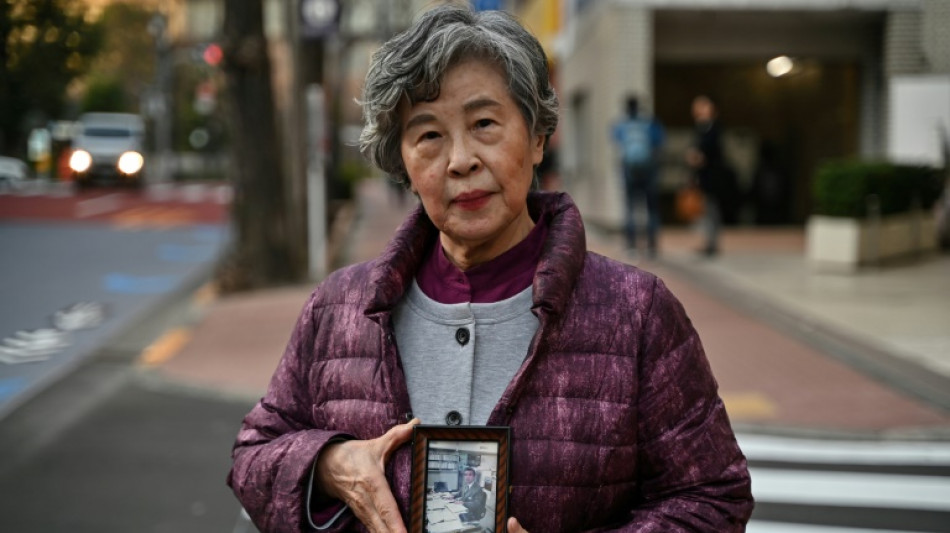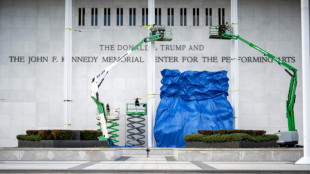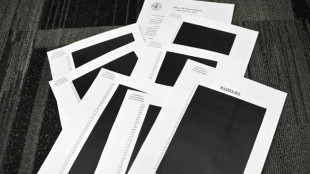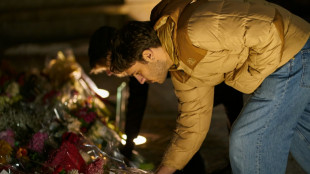
-
 Hodge edges towards century as West Indies 310-4, trail by 265
Hodge edges towards century as West Indies 310-4, trail by 265
-
US Afghans in limbo after Washington soldier attack

-
 England lose Duckett in chase of record 435 to keep Ashes alive
England lose Duckett in chase of record 435 to keep Ashes alive
-
Australia all out for 349, set England 435 to win 3rd Ashes Test

-
 US strikes over 70 IS targets in Syria after attack on troops
US strikes over 70 IS targets in Syria after attack on troops
-
Australian lifeguards fall silent for Bondi Beach victims

-
 Trump's name added to Kennedy Center facade, a day after change
Trump's name added to Kennedy Center facade, a day after change
-
West Indies 206-2, trail by 369, after Duffy's double strike

-
 US strikes Islamic State group in Syria after deadly attack on troops
US strikes Islamic State group in Syria after deadly attack on troops
-
Epstein files opened: famous faces, many blacked-out pages

-
 Ravens face 'special' Patriots clash as playoffs come into focus
Ravens face 'special' Patriots clash as playoffs come into focus
-
Newly released Epstein files: what we know

-
 Musk wins US court appeal of $56 bn Tesla pay package
Musk wins US court appeal of $56 bn Tesla pay package
-
US judge voids murder conviction in Jam Master Jay killing

-
 Trump doesn't rule out war with Venezuela
Trump doesn't rule out war with Venezuela
-
Haller, Aouar out of AFCON, Zambia coach drama

-
 Nasdaq rallies again while yen falls despite BOJ rate hike
Nasdaq rallies again while yen falls despite BOJ rate hike
-
Bologna win shoot-out with Inter to reach Italian Super Cup final

-
 Brandt and Beier send Dortmund second in Bundesliga
Brandt and Beier send Dortmund second in Bundesliga
-
Trump administration begins release of Epstein files

-
 UN Security Council votes to extend DR Congo mission by one year
UN Security Council votes to extend DR Congo mission by one year
-
Family of Angels pitcher, club settle case over 2019 death

-
 US university killer's mystery motive sought after suicide
US university killer's mystery motive sought after suicide
-
Rubio says won't force deal on Ukraine as Europeans join Miami talks

-
 Burkinabe teen behind viral French 'coup' video has no regrets
Burkinabe teen behind viral French 'coup' video has no regrets
-
Brazil court rejects new Bolsonaro appeal against coup conviction

-
 Three-time Grand Slam winner Wawrinka to retire in 2026
Three-time Grand Slam winner Wawrinka to retire in 2026
-
Man Utd can fight for Premier League title in next few years: Amorim

-
 Pandya blitz powers India to T20 series win over South Africa
Pandya blitz powers India to T20 series win over South Africa
-
Misinformation complicated Brown University shooting probe: police

-
 IMF approves $206 mn aid to Sri Lanka after Cyclone Ditwah
IMF approves $206 mn aid to Sri Lanka after Cyclone Ditwah
-
US halts green card lottery after MIT professor, Brown University killings

-
 Stocks advance as markets cheer weak inflation
Stocks advance as markets cheer weak inflation
-
Emery says rising expectations driving red-hot Villa

-
 Three killed in Taipei metro attacks, suspect dead
Three killed in Taipei metro attacks, suspect dead
-
Seven Colombian soldiers killed in guerrilla attack: army

-
 Amorim takes aim at Man Utd youth stars over 'entitlement'
Amorim takes aim at Man Utd youth stars over 'entitlement'
-
Mercosur meets in Brazil, EU eyes January 12 trade deal

-
 US Fed official says no urgency to cut rates, flags distorted data
US Fed official says no urgency to cut rates, flags distorted data
-
Rome to charge visitors for access to Trevi Fountain

-
 Spurs 'not a quick fix' for under-fire Frank
Spurs 'not a quick fix' for under-fire Frank
-
Poland president accuses Ukraine of not appreciating war support

-
 Stocks advance with focus on central banks, tech
Stocks advance with focus on central banks, tech
-
Amorim unfazed by 'Free Mainoo' T-shirt ahead of Villa clash

-
 PSG penalty hero Safonov ended Intercontinental win with broken hand
PSG penalty hero Safonov ended Intercontinental win with broken hand
-
French court rejects Shein suspension

-
 'It's so much fun,' says Vonn as she milks her comeback
'It's so much fun,' says Vonn as she milks her comeback
-
Moscow intent on pressing on in Ukraine: Putin

-
 UN declares famine over in Gaza, says 'situation remains critical'
UN declares famine over in Gaza, says 'situation remains critical'
-
Guardiola 'excited' by Man City future, not pondering exit


Japan victims voice fears 30 years after sarin subway attack
Three decades since Shizue Takahashi's husband and a dozen others were killed with a nerve agent on Tokyo's subway, she fears Japan could see a repeat of the doomsday cult attack.
Takahashi, whose husband worked for the metro system, told AFP it was "unbelievable" that successor groups to Aum Shinrikyo, the sect that carried out the attack, remain active today.
"In this volatile society, in Japanese society where it is not so easy any more to make a living, some say people are more prone to be attracted to cults," the 78-year-old said.
"I feel, with a real sense of crisis, that the same thing could happen again."
Aum members released sarin on five trains during morning rush hour on March 20, 1995 -- killing 13 people while a 14th victim, who suffered severe brain damage, died in 2020.
More than 5,800 others were injured in the attack, for which the wild-haired, nearly blind cult leader Shoko Asahara was executed in 2018 along with 12 disciples.
On the day, five men, one on each train, dropped bags of sarin on the floor and pierced them with umbrellas.
The assailants quickly disembarked but the carriages filled with deadly fumes as the trains drove on.
Passengers first noticed a smell that irritated their eyes and nose. Then they began to gasp for air and some collapsed, convulsing or foaming at the mouth.
As people scrambled to escape, Takahashi's husband Kazumasa, then 50, was seen carrying a bag of sarin away by hand and wiping the floor with newspapers, before keeling over.
When Takahashi arrived at hospital, "I saw so many people suffering that I could tell something disastrous had happened," she said.
"The doctors had tried very hard to resuscitate my husband... but his body was already cold. He was dead."
- Memories 'fading' -
Aum's leader Asahara, whose real name was Chizuo Matsumoto, preached that the apocalypse was coming and that murders could elevate souls to a higher realm.
Disaffected young people in Japan, including doctors and engineers who later manufactured toxins, took solace in his doctrines.
At the height of its influence, the cult counted more than 10,000 followers, mostly in Japan but also in Russia, the United States and elsewhere.
Aum has since disbanded, but its hanged guru is still worshipped in Japan by an estimated 1,600 members of successor groups.
Experts warn that the groups are reaching young recruits in secret both in person and through social media and messaging apps, where they are also spreading posts saying that Aum's crimes were misportrayed.
"It's concerning that memories of the series of heinous crimes committed by Aum Shinrikyo are fading, and that the dangers of the group are not properly understood," Justice Minister Keisuke Suzuki told reporters recently.
"This is not a story from the past. It is a present problem."
- Flashbacks -
Authorities believe Asahara ordered the subway carnage in an effort to deflect investigators who were closing in on Aum facilities.
He and several followers had stood for public office in 1990 but none were elected, something that may have pushed him to militarise the group.
Two months after the sarin attack, Asahara was arrested and later convicted of 13 major crimes including the train strike and another using VX nerve agent.
Survivors of the subway attack say they still have vision problems, flashbacks and nightmares, with some too afraid to approach stations.
On one of the targeted trains was architect Manabu Takeda, then a 31-year-old father of two small children.
"I noticed some liquid oozing out from a package wrapped in newspaper. The liquid was seeping out on the floor, which started to worry me," he told AFP.
Takeda moved down the carriage and soon got off at Kasumigaseki station in central Tokyo.
"I was incredibly fortunate" to suffer no major injury, Takeda said.
Even so, his pupils temporarily contracted and he felt his vision became darker, as if he were wearing sunglasses.
"I want people to remember the attack," said Takeda, who describes himself as now "very aware of my surroundings".
"I want to say: Are you OK with just looking at your phone, and not paying attention to what's happening around you?"
O.Krause--BTB
